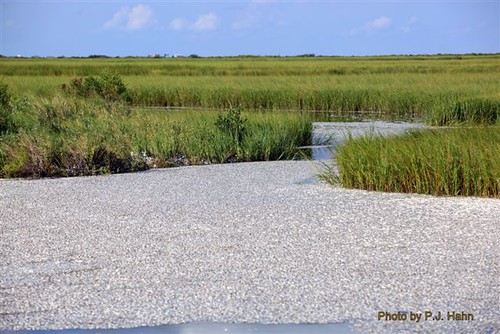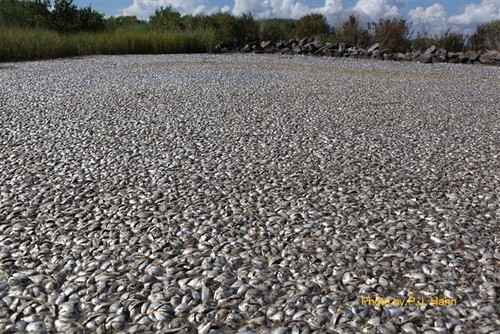The Oil Dilemma In The Gulf; A Crisis of Communication
Cross-posted from NRDC Switchboard. 
Down in the bayou, Il faut le voir pour le croire (seeing is believing).
Over the past two months, fishermen down here have seen things that just don’t add up. They've seen oil in the water while industry experts, scientists, politicians and doctors have said basically the same thing: you dodged the bullet, the oil is disappearing, the marsh is coming back, the fishing will return, you’ll be fine.
We’re from Washington and we’re here to help you.
Now people have lost their cleanup jobs and are wondering what comes next after their fishing market has collapsed. Politicians are promising them the world. But people here know better. They’ve seen this it before. Katrina knocked them off their feet and nearly out of the ring. Still, they clawed their way back despite all the broken promises of help.
But this oil disaster is different. People here don’t really know how to rebuild. And they don’t know what to prepare for. Scientists are saying the oil is rapidly disappearing and degrading, but it's hard to believe. Fishermen out on the water see it with their own eyes. The fish aren’t there in the same numbers. They see oil and tar balls washing in on the shore. Shrimp and crab catches are sometimes spotted with oil. There are frequent fish kills in areas heavily oiled, later discounted by fish and wildlife experts as oxygen depletion that's common this time of year.


Still, fishermen don’t believe it. These are huge, unprecedented fish kills in areas that have oil. They know crude in the water can contribute to depleted oxygen levels in the water. No one trusts the people doing the tests anymore.
I have talked to countless people here who complain about poor information from EPA scientists and fish and wildlife experts. I've watched people here in Plaquemines Parish roll their eyes in disbelief as federal and state health officials tell them there are no contaminated fish here. How can you say nothing is contaminated when this much oil is in the water, they ask? No one here thinks 75% of the oil has been collected, evaporated or dissipated into harmless droplets. And no one in this area believes it will go away anytime soon. They know its mark will be felt for a long time, washing in with the tides, their lives forever transformed.
It is, in a nutshell, a crisis of communication. It was fueled by a torrent of misinformation about the blowout and over $100 million of BP's smarmy PR, not to mentioned Pollyannaish predictions and clunky communications efforts by the scientific community. The well of goodwill has been poisoned. Credibility of politicians in DC and Baton Rouge has been shot. Even here in Plaquemines, where Billy Nungesser has gained national notoriety as a champion of the people, a close election is sowing greater distrust and disillusionment. It's not likely to get any better soon.
But on Wednesday, there was a breath of fresh air coming from one local politician. St. Bernard Parish President Craig Paul Taffaro testified before the House Committee on Homeland Security and spoke truth to power, stating a feeling most in the bayou would heartily endorse:
The information presented by BP in print and broadcast media often erupted into episodes of frustration and disbelief as the disconnect between the reality of a local experience and the stated information was clearly displayed…Requests to integrate the various scientific communities with local authorities and the local fleet who held significant historical knowledge was met with dismissal and a lack of interest. This resulted in the scientific community losing critical credibility within the local populations that needed to buy in for the overall success of this response….Predicting conclusions of future and untested protocols only exacerbated the lack of trust between the scientific community and the commercial fishing industry….(BP’s) pushing out images that are inconsistent with the actual experience of the local community only serves to widen the disconnect between the responsible party and those affected by the incident.
The disconnect between the reality of a local experience and stated information. That's key. Happy talk and scientific claims of success don't go over well here right now. People want to match what they're seeing with what they can believe. They want information they can use.
Throughout this disaster, it’s become abundantly clear that the people who poisoned these waters are good at making money from the oil and gas sucked out of the sea, but they're not so good at cleaning it up. People here know that. They don’t need experts telling them things are getting better. That just doesn't jive with the fish kills, tar balls and oil that continues to wash into the marshes. Most people in the rest of the country think things are better down here. But they're still not willing to buy Louisiana fish.
Why?
Someone outside of Louisiana thinks there's a problem here. The fishermen of the bayou see what's happening. Their livelihood is on life-support while the doctors are telling them get back to work. They just want the truth so they can heal themselves and get back on their feet.
